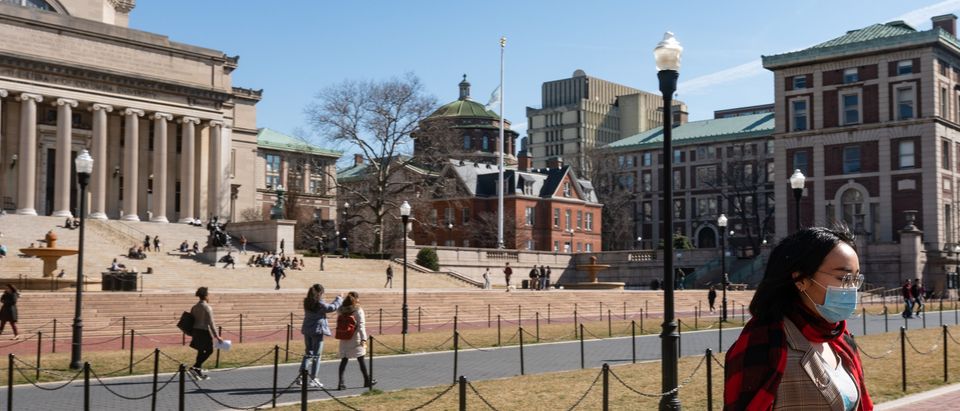More than three years after President Trump took office and Betsy DeVos was sworn in as Secretary of Education, her department finally issued new final regulations on sexual misconduct in institutions of higher education. One has to ask, why did it take so long?
An old legal saying tells us that justice delayed is justice denied. Do we have any idea how many students during the three-year delay were denied justice and punished under the old Obama–Biden rules, under which students were essentially presumed guilty until proven innocent?
Does anybody care?
It is ironic, of course, that the new rules appeared at almost exactly the same moment that a woman, Tara Reade, came forward to accuse former vice president Biden of sexual misconduct—twenty-seven years ago. The woman’s story, like any good story, has been reworked by its author, and many doubt its validity. But it has put Biden and his friends in a bind: whatever happened to the feminist woke liberal-progressive mantra, “Believe All Women”?
That slogan was not just political opportunism, of course. It was political opportunism that everyone knew was just political opportunism. If, as a hundred, or more likely a thousand, people have said in the last twenty minutes, Democrats and other woke liberal progressives and their allies at places like the New York Times didn’t have double standards, they wouldn’t have any standards at all. That crowd didn’t care two pins about sexual misconduct in high places while William Jefferson Clinton was president, but fainted away like the new maid at the first whiff of sexual misconduct downwind from President Donald Trump.
President Clinton’s sexually scandalous presidency produced a year’s debate over the survival of American ideals and our standards of justice and fairness. We asked, “Does perjury matter?” Indeed, we even had to ask, “What is truth?”—not to mention, “What is ‘is’”? Is the rule of law important? What happens if we don’t have that rule, or if people routinely disobey it? Or if powerful people routinely flout it? Can we have justice? Did Bill Clinton’s Paula Jones get justice? Did Brett Kavanaugh? Did the hundreds of college students who were “tried” under the Biden rules in the kangaroo college courts on sexual ethics get justice?
Probably not.
According to the New York Times, Meredith Smith, the assistant provost for Title IX compliance at Tulane University, said she worried how her students would respond to the rules. “They’re going to see this incredibly legalistic way of responding to the harms that they’ve experienced, including being accused of horrible things, and instead of thinking of us as people who can help, we’re now here to litigate,” she is quoted as saying. “I thought I was working in civil rights and ensuring access to education, but instead I’m going to be running a courtroom.”
Well, yes. It is like a courtroom. Taking away a student’s rights is serious business: what is it supposed to be like—a road runner cartoon?
In October 2015, twenty-eight Harvard law professors said Harvard University’s disciplinary procedures lacked the most basic elements of fairness and due process and were overwhelmingly stacked against the accused. The professors urged Harvard to stand up to the Obama administration’s pressure to eliminate due process, and stand up for principle in the face of funding threats. The professors urged in vain.
Here’s a quote from a prominent politician—but can you tell whether the statement was said after the Obama–Biden rules were promulgated or after the new DeVos regulations were? “[We] will not stand silently as the … administration attacks the civil rights of students and will fight to ensure that every college campus is free from the fear and threat of discrimination, harassment or violence.” Is that politician speaking up for (pandering to?) students charging sexual assault or students accused of sexual assault? What do we take from that confusion?
You have to enjoy the way the New York Times put it in its piece about the new rules: “Critics said schools felt pressured to side with accusers without extending sufficient rights to the accused. And dozens of students have won court cases against their colleges for violating their rights under the Obama-era rules.” Exactly!
That’s why the rules were changed. But Speaker Nancy Pelosi prefers the old kangaroo court rules, which is why she said, “Democrats will not stand silently as the Trump administration attacks the civil rights of students ….”
Justice delayed. But justice at last.
Daniel Oliver is Chairman of the Board of the Education and Research Institute and a Director of Pacific Research Institute for Public Policy in San Francisco. In addition to serving as Chairman of the Federal Trade Commission under President Reagan, he was Executive Editor and subsequently Chairman of the Board of William F. Buckley Jr.’s National Review.


